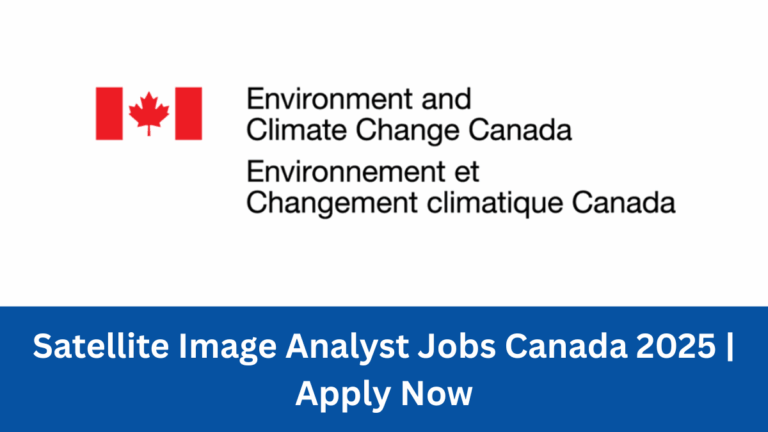Exciting Satellite Image Analyst jobs in Canada for 2025 have been announced by Environment and Climate Change Canada (ECCC). The Canadian Ice Service is seeking skilled and passionate individuals to join their team as Satellite Image Analysts for sea ice and oil detection. This is a premier opportunity for professionals in remote sensing jobs in Canada to contribute to critical environmental monitoring and maritime safety. If you have a background in GIS, geomatics, or a related scientific field, this is your chance to build a rewarding career in the federal government.
Overview of the Satellite Image Analyst Role
This table provides a summary of the key details for this EG-05 government job opportunity.
Property |
Details |
|---|---|
Position Title |
Satellite Image Analyst – Sea Ice and Oil Detection |
Department |
Environment and Climate Change Canada |
Agency |
Canadian Ice Service, Meteorological Service of Canada |
Location |
Ottawa, Ontario |
Classification |
EG-05 |
Salary Range |
$77,169 to $97,013 per year |
Job Type |
Indeterminate or Term appointments |
Work Schedule |
Shift work (rotating 10-hour shifts) |
Application Deadline |
29 May 2026 |
Contact Person |
Lily Tabb, Human Resources Advisor (Lily.Tabb@ec.gc.ca) |
Application Portal |
About Environment and Climate Change Canada (ECCC)
Environment and Climate Change Canada is the lead federal department for a wide range of environmental issues, including the protection of air, water, and wildlife, and taking action on climate change. This role is situated within the world-renowned Canadian Ice Service, a division of the Meteorological Service of Canada. The Canadian Ice Service provides the most accurate and timely information about ice in Canada’s navigable waters. A career here means you will be part of a team with a direct impact on the safety of Canadian waterways and the protection of the marine environment. For more information, visit the official ECCC website.
Key Responsibilities and Duties
As a Satellite Image Analyst, you will be at the forefront of Canada’s ice and marine pollution monitoring operations. This role is offered directly by Environment and Climate Change Canada within the Canadian Ice Service, requiring expertise in remote sensing, GIS, SAR imagery, and marine ice analysis. Your responsibilities will include:
-
Image Analysis: Using a Geographical Information System (GIS) to interpret various satellite images (visible, infrared, and SAR) to identify and analyze sea and lake ice.
-
Pollution Monitoring: Monitoring Canadian waters for potential illegal pollution discharges and providing reports to responding agencies.
-
Collaboration: Working closely with a team of analysts and forecasters in a dynamic operational environment.
-
Research Support: Participating in scientific and technical research as a technician.
Required Qualifications and Experience
To be considered for these GIS analyst jobs in Canada, you must meet the following criteria:
-
Education: A college diploma/certificate or a university degree from a recognized institution with a specialization in geography, GIS, geomatics, oceanography, meteorology, remote sensing, or a related scientific discipline.
-
Experience: Experience using ArcGIS or other similar GIS applications is essential. Experience gained during your education is considered valid.
-
Knowledge: A strong understanding of remote sensing principles and the characteristics of satellite synthetic aperture radar (SAR) is required.
-
Competencies: You must demonstrate adaptability, a client-focused approach, and the ability to work effectively with others.
Why Pursue a Career with the Canadian Ice Service?
A Canadian remote sensing career with the Canadian Ice Service offers numerous benefits:
-
Meaningful Work: Play a direct role in ensuring the safety of Canada’s waterways and protecting the marine environment.
-
Cutting-Edge Technology: Work with the latest satellite remote sensing technology and GIS applications.
-
Collaborative Environment: Join a dedicated team of experts in a supportive and collaborative operational setting.
-
Government Benefits: Enjoy a competitive salary, comprehensive benefits, and a stable career path within the federal public service.
How to Apply
The application process for these federal government remote sensing jobs is managed through the official Government of Canada jobs portal.
Application Deadline: 29 May 2026
-
Visit GC Jobs: The official job announcement and application portal can be found on the GC Jobs website.
-
Create Your Profile: You will need to create a profile and provide your résumé.
-
Demonstrate Qualifications: Your application must clearly explain how you meet the essential education and experience qualifications.
-
Submit Your Application: Complete the online application before the closing date.
For any questions regarding the application process, please contact Lily Tabb, Human Resources Advisor, at Lily.Tabb@ec.gc.ca.
Frequently Asked Questions (FAQs)
1. How do I apply for Satellite Image Analyst jobs in Canada?
You must apply online through the official Government of Canada Jobs (GC Jobs) website. The application requires a detailed résumé and clear explanations of how you meet the essential qualifications.
2. What are the requirements for a remote sensing analyst career in the Canadian Ice Service?
A post-secondary education in a relevant scientific field (like GIS, geomatics, or remote sensing) and experience with GIS applications are essential. Knowledge of remote sensing principles and SAR imagery is also required.
3. What is an EG-05 GIS analyst job in Canada?
EG-05 is a classification level within the Canadian federal public service for technical positions. In this context, it refers to a professional-level GIS analyst role with a specific salary range and set of responsibilities.






